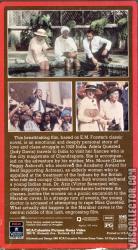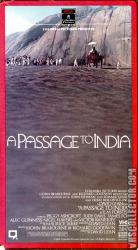A Passage to India
Catalog Number
60485
-
Primary Distributor (If not listed, select "OTHER")
Catalog Number
60485
Primary Distributor (If not listed, select "OTHER")
Release Year
Country
N/A (NTSC)
N/A | N/A | N/A
N/A | N/A
A Passage to India (1984)
Additional Information
Additional Information
David Lean, the Director of "Doctor Zhivago", "Lawrence of Arabia" and "The Bridge on the River Kwai", invites you on . . .[A Passage to India]
A Passage to India, director David Lean's final film (for which he also received editing credit), breaks no new ground cinematically, but remains an exquisitely assembled harkback to such earlier Lean epics as Doctor Zhivago and Ryan's Daughter. Based on the novel by E. M. Forster, the film is set in colonial India in 1924. Adela Quested (Judy Davis), a sheltered, well-educated British woman, arrives in the town of Chandrapore, where she hopes to experience "the real India". Here she meets and befriends Dr. Aziz (Victor Banerjee), who, despite longstanding racial and social taboos, moves with relative ease and freedom amongst highborn British circles. Feeling comfortable with Adela, Aziz invites her to accompany him on a visit to the Marabar caves. Adela has previously exhibited bizarre, almost mystical behavior during other ventures into the Indian wilderness: this time, she emerges from the caves showing signs of injury and ill usage. To Aziz' horror, he is accused by Adela of raping her. Typically, the British ruling class rallies to Adela's defense, virtually convicting Aziz before the trial ever begins. Though he is eventually acquitted due to lack of evidence (in fact, director Lean never shows us what really happened), Aziz is ruined in the eyes of both the British and his own people-as is Adela. Woven into these proceedings is a subplot involving Adela's elderly travelling companion Mrs. Moore (Peggy Ashcroft), who through a series of plot twists too complex to describe here becomes a heroine of the Indian Independence movement. A Passage to India was nominated for several Academy Awards, scoring wins in the categories of Best Supporting Actress (Peggy Ashcroft) and Best Original Score (Maurice Jarre). A theatrical version of A Passage to India, written by Santha Rama Rau, was previously adapted for television by the BBC in the mid-1970s.
A Passage to India is a 1984 drama film written and directed by David Lean. The screenplay is based on the 1924 novel of the same title by E. M. Forster and the 1960 play by Santha Rama Rau that was inspired by the novel.
This was the final film of Lean's career, and the first he had directed in 14 years. A Passage to India received eleven nominations at the Academy Awards, including Best Picture, Best Director for Lean, and Best Actress for Judy Davis for her portrayal as Adela Quested. Peggy Ashcroft won the Academy Award for Best Supporting Actress for her portrayal as Mrs Moore, making her, at 77, the oldest actress to win the award, and Maurice Jarre won his third award for Best Original Score.
Lean's final film became a critics' favourite in 1984, opening to tremendous praise worldwide. Vincent Canby of the New York Times called Lean's film "his best work since The Bridge on the River Kwai and Lawrence of Arabia and perhaps his most humane and moving film since Brief Encounter. Though vast in physical scale and set against a tumultuous Indian background, it is also intimate, funny and moving in the manner of a film maker completely in control of his material . . . Though [Lean] has made A Passage to India both less mysterious and more cryptic than the book, the film remains a wonderfully provocative tale, full of vivid characters, all played to near perfection ."[9]
Roger Ebert of the Chicago Sun-Times observed, "Forster's novel is one of the literary landmarks of this century, and now David Lean has made it into one of the greatest screen adaptations I have ever seen . . . [He] is a meticulous craftsman, famous for going to any length to make every shot look just the way he thinks it should. His actors here are encouraged to give sound, thoughtful, unflashy performances . . . and his screenplay is a model of clarity."[10]
Variety called the film "impeccably faithful, beautifully played and occasionally languorous" and added, "Lean has succeeded to a great degree in the tricky task of capturing Forster's finely edged tone of rational bemusement and irony."[11]
Time Out London thought the film was "a curiously modest affair, abandoning the tub-thumping epic style of Lean's late years. While adhering to perhaps 80 per cent of the book's incident, Lean veers very wide of the mark over E.M. Forster's hatred of the British presence in India, and comes down much more heavily on the side of the British. But he has assembled his strongest cast in years . . . And once again Lean indulges his taste for scenery, demonstrating an ability with sheer scale which has virtually eluded British cinema throughout its history. Not for literary purists, but if you like your entertainment well tailored, then feel the quality and the width."[12]
Channel 4 said, "Lean was always preoccupied with landscapes and obsessed with the perfect shot – but here his canvas is way smaller than in Lawrence of Arabia, for instance . . . Still, while the storytelling is rather toothless, A Passage to India is certainly well worth watching for fans of the director's epic style
Release Date: December 14, 1984
Distrib: Columbia Pictures
Boxoffice: $27,187,653 2014: $64,007,100
A Passage to India, director David Lean's final film (for which he also received editing credit), breaks no new ground cinematically, but remains an exquisitely assembled harkback to such earlier Lean epics as Doctor Zhivago and Ryan's Daughter. Based on the novel by E. M. Forster, the film is set in colonial India in 1924. Adela Quested (Judy Davis), a sheltered, well-educated British woman, arrives in the town of Chandrapore, where she hopes to experience "the real India". Here she meets and befriends Dr. Aziz (Victor Banerjee), who, despite longstanding racial and social taboos, moves with relative ease and freedom amongst highborn British circles. Feeling comfortable with Adela, Aziz invites her to accompany him on a visit to the Marabar caves. Adela has previously exhibited bizarre, almost mystical behavior during other ventures into the Indian wilderness: this time, she emerges from the caves showing signs of injury and ill usage. To Aziz' horror, he is accused by Adela of raping her. Typically, the British ruling class rallies to Adela's defense, virtually convicting Aziz before the trial ever begins. Though he is eventually acquitted due to lack of evidence (in fact, director Lean never shows us what really happened), Aziz is ruined in the eyes of both the British and his own people-as is Adela. Woven into these proceedings is a subplot involving Adela's elderly travelling companion Mrs. Moore (Peggy Ashcroft), who through a series of plot twists too complex to describe here becomes a heroine of the Indian Independence movement. A Passage to India was nominated for several Academy Awards, scoring wins in the categories of Best Supporting Actress (Peggy Ashcroft) and Best Original Score (Maurice Jarre). A theatrical version of A Passage to India, written by Santha Rama Rau, was previously adapted for television by the BBC in the mid-1970s.
A Passage to India is a 1984 drama film written and directed by David Lean. The screenplay is based on the 1924 novel of the same title by E. M. Forster and the 1960 play by Santha Rama Rau that was inspired by the novel.
This was the final film of Lean's career, and the first he had directed in 14 years. A Passage to India received eleven nominations at the Academy Awards, including Best Picture, Best Director for Lean, and Best Actress for Judy Davis for her portrayal as Adela Quested. Peggy Ashcroft won the Academy Award for Best Supporting Actress for her portrayal as Mrs Moore, making her, at 77, the oldest actress to win the award, and Maurice Jarre won his third award for Best Original Score.
Lean's final film became a critics' favourite in 1984, opening to tremendous praise worldwide. Vincent Canby of the New York Times called Lean's film "his best work since The Bridge on the River Kwai and Lawrence of Arabia and perhaps his most humane and moving film since Brief Encounter. Though vast in physical scale and set against a tumultuous Indian background, it is also intimate, funny and moving in the manner of a film maker completely in control of his material . . . Though [Lean] has made A Passage to India both less mysterious and more cryptic than the book, the film remains a wonderfully provocative tale, full of vivid characters, all played to near perfection ."[9]
Roger Ebert of the Chicago Sun-Times observed, "Forster's novel is one of the literary landmarks of this century, and now David Lean has made it into one of the greatest screen adaptations I have ever seen . . . [He] is a meticulous craftsman, famous for going to any length to make every shot look just the way he thinks it should. His actors here are encouraged to give sound, thoughtful, unflashy performances . . . and his screenplay is a model of clarity."[10]
Variety called the film "impeccably faithful, beautifully played and occasionally languorous" and added, "Lean has succeeded to a great degree in the tricky task of capturing Forster's finely edged tone of rational bemusement and irony."[11]
Time Out London thought the film was "a curiously modest affair, abandoning the tub-thumping epic style of Lean's late years. While adhering to perhaps 80 per cent of the book's incident, Lean veers very wide of the mark over E.M. Forster's hatred of the British presence in India, and comes down much more heavily on the side of the British. But he has assembled his strongest cast in years . . . And once again Lean indulges his taste for scenery, demonstrating an ability with sheer scale which has virtually eluded British cinema throughout its history. Not for literary purists, but if you like your entertainment well tailored, then feel the quality and the width."[12]
Channel 4 said, "Lean was always preoccupied with landscapes and obsessed with the perfect shot – but here his canvas is way smaller than in Lawrence of Arabia, for instance . . . Still, while the storytelling is rather toothless, A Passage to India is certainly well worth watching for fans of the director's epic style
Release Date: December 14, 1984
Distrib: Columbia Pictures
Boxoffice: $27,187,653 2014: $64,007,100
Related Links






Comments0
Login / Register to post comments